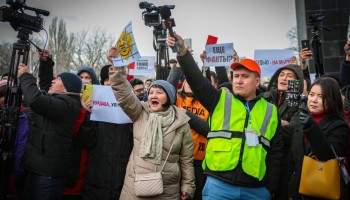All citizens will have to do is to simply tell the government what they’ve been hiding.
Under the new laws, the government assures that there is no need to explain the wealth’s source or to fear criminal prosecution — anonymity and full immunity is ensured, the laws claim, with only the exception of assets which were used to finance terrorist activity.
When the administration intended to propose the bill is not clear, but according to the laws, a draft of which was obtained by OCCRP, citizens will have until the end of 2022 to declare their assets.
The drafts say that their implementation will help reduce the Central Asian nation’s robust shadow economy.
Many disagree.
“The proposed project, on the contrary, encourages the extraction of income from such serious crimes as, for example, human trafficking, child exploitation and forced labor”, legal experts from the Adilet Law Firm found in an analysis of the effects of the new laws.
Also granted immunity will those in ongoing trials related to their illegal assets. If the laws pass, their cases are slated to be dismissed, though the law won’t apply to those on the wanted list.
What does Kyrgyzstan or it’s people get out of the new arrangement?
Nothing, at least if the asset value is less than 100 million Kyrgyz som (just over US$1 million), if more — then a tax of 1 million som ($10,500) will be levied by the state treasury.
Who and how the assets’ value will be estimated remains unknown.
The draft laws are not public yet and it isn’t clear when they are planned to be, but the presidential administration already ordered it reviewed by legal experts.
The Adilet analysis says the proposed laws contradict the Kyrgyz Constitution, its international agreements, and counteracts the state’s strategy on fighting corruption.
According to the laws, not only will newly declared assets be kept secret – including those of high-level public officials – but the government will destroy all records of past asset declarations.
Currently Kyrgyzstan is the only country in central Asia that keeps a public record of high-level officials’ assets. Though flawed, it had allowed journalists to investigate corruption in the country.
“This point change reflects the desire to hide from the public all information about the income of both senior and middle-level state and municipal employees. In fact, this is the legitimization of corruption,” Adilet’s analysis concluded.






